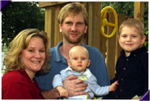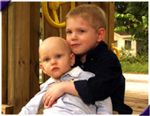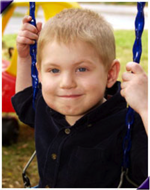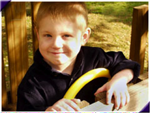May 2001–July 2001
"In May 2001, we noticed that Nicolas had a swollen lymph node. At first, we were not worried because he did not have a fever, his energy was high and his spirits were good. After a couple of weeks, the lymph node was still swollen, so we took Nicolas to the doctor. Initially, infection was suspected, but the tests came back negative. Then, allergies were suspected and, again, were later ruled out.
In the meantime, we received some wonderful news. In June, we learned that we were going to have another baby the following March. What a thrill! Little did we know at the time what this new baby would come to mean to our family.
A few weeks later, our doctor performed a biopsy on Nicolas's swollen lymph node. We immediately asked if cancer was a suspect but was assured that cancer was not likely because Nicolas’s blood tests had been good and he was not showing any cancer symptoms. A couple of days later, we called for the test results and were told that they were not available yet. As we later learned, the doctors already knew at the time but did not want to give us the bad news over the phone.
July 19, 2001
We received the biopsy results on Thursday, July 19, 2001—one of the dates that will forever be engraved in our memory. When we walked into the doctor's office, we had no suspicion that Nicolas might have cancer. The doctor entered the room with a somber look on his face and said, "It's not good." He told us Nicolas was suffering from T-Cell lymphoma, and he had made an appointment for us with an oncologist for the next day. At that point, we knew this was serious.
The next day, the oncologist answered our questions, took some tests and decided to immediately admit Nicolas to the hospital and begin chemotherapy. At this point, they also started talking to us about saving the unborn baby's umbilical cord blood through a bank like Cryo-Cell.
The doctors explained that we would only need the transplant if the chemotherapy failed to work. And if a transplant was needed, a test would be performed to see if the baby’s blood was suitable for the transplant. If the boys were a match, the doctors could give Nicolas a transplant using the stem cells from the baby's umbilical cord blood. They said this would be a better option than a bone marrow transplant because cord blood transplants had a higher success rate than bone marrow transplants. We kept the idea of storing the cord blood in the back of our minds, but to be honest, we did not think we would ever need it—we were sure the chemo would work.
August 2001
Despite the horrific news, there was some encouragement. Initially, our oncologist thought he would find the cancer in Nicolas's bone marrow but tests showed that his central nervous system was clear of any signs of cancer, and the rest of his body was only 11 percent cancerous. Throughout this time, medical reports were optimistic, the treatments were going well, and Nicolas's blood was strong.
On a daily basis, we had to deal with infections, fevers, keeping things sterile and traveling back and forth from the hospital. The upside was that Nicolas's spirits stayed high. He played in the house like a normal child, had lots of energy and enjoyed watching his favorite cartoons. This made it much easier on us.
September 2001
Nicolas completed the six-week induction phase of his scheduled two-year chemotherapy treatment. The treatment was traumatic for Nicolas and, truthfully, for all of us. His chemo was progressing to stronger dosage and he threw up frequently. He started to get very upset about having to return to the hospital. But the good news, really the great news, was that the doctors did a complete re-evaluation of his condition, and the cancer was undetectable in Nicolas's body. They let him come home two days early.
Late September 2001
September 21 was another big day for us. The doctors announced that Nicolas was in clinical remission. This was an expected milestone in his battle with cancer, but we were thankful, nonetheless. Nicolas had reached further than many patients with the same disease. At this stage, Nicolas continued to be in good spirits. He experienced hair loss and some weight loss, but for the most part, he did not appear sick or tired.
 December 27, 2001
December 27, 2001
This is another date we can't forget. We received the devastating news that the doctor found cancer in Nicolas's spinal fluid. Our doctor was very distressed by the fact that Nicolas was relapsing so soon and during such an intense phase of chemo. The doctors took Nicolas off the chemo because it failed to work. We were told that the only remaining option was a stem cell transplant attempt, and the best chance for a perfect match lied in the umbilical cord blood of Nicolas's unborn sibling.
Sam Sharf, the transplant coordinator at All Children's Hospital in St. Petersburg, Florida, (where Nicolas was referred for transplant) recommended that we use Cryo-Cell to store the umbilical cord blood. When we contacted Cryo-Cell, they explained to us that it was a very simple process. We would simply fill out some paperwork, and it would send us a cord blood kit to take to the hospital on the day of the delivery. During the delivery, the doctors would collect the umbilical cord blood immediately following the birth and send it to Cryo-Cell for processing, testing and storing. We went forward with all the preparations and soon all there was left for us to do was pray for a healthy, and easy, delivery and a match for Nicolas.
January 2002
Despite the latest setback, there was some positive news. The cancer was local and manageable, so this was not considered a total relapse. We knew the best bet was still the stem cell transplant, and we prayed that the baby would be a perfect match for Nicolas.
 February 18, 2002
February 18, 2002
Our new baby boy was delivered via C-section at 1:19 p.m. He came in at 6 pounds, 9 ounces and was 20 inches long. We had difficulty choosing a name. It was not until right before the birth, we decided on Nathaniel, which means "Given by God," in expectation of what his life would bring about. Nathaniel was a good boy from the start—not crying.
The doctor collected a significant amount of blood from Nathaniel's umbilical cord and sent it directly to Cryo-Cell for processing, testing and storing. It would take another two weeks for us to find out if Nathaniel was a match. Nathaniel's cord blood would remain at Cryo-Cell while we waited for the results.
The emotions on that day were unbelievable. During the birth of Nathaniel, I saw the medical staff remove the bag of cord blood. I remember looking at that bag and thought,
There is my son's life! As that little bag of cord blood was carried away and packaged up, I literally felt like I was looking at my son's life. I felt a miracle in the making, and it was wonderful.
March 30, 2002
We were eating at the Olive Garden when we received the call. The minute the phone rang, we knew it was going to be about the stem cells. The tests found that the boys were a perfect match. We immediately got up from the table and began calling all our family and friends. It was the best feeling in the world.
Around the same time, we had yet another setback. We learned that Nicolas had an infection that vegetated in his heart and formed a clot. There was a mass attached to his heart valve, and we thought Nicolas was actually headed towards an open-heart surgery. This could have caused grave complications in the transplant process, but the clot dissipated after a few weeks. There was absolutely no explanation for this.
 Mid-April 2002
Mid-April 2002
Once the heart clot disappeared, we were ready to begin preparing for the transplant. Nicolas had six days of cranial spinal radiation, three days of total body irradiation, two days of heavy chemo, and one day of rest. This was the protocol to destroy the cancerous cells and make room for Nathaniel's good cells.
April 30, 2002
Transplant day. Ironically, this day was somewhat anticlimactic. The blood had been stored since February at Cryo-Cell, and they had delivered it to All Children's Hospital a week before the transplant. The transplant itself was very much like a blood transfusion and only took a few minutes. After the transplant, we celebrated by shooting silly string in the hospital room and at the nurses. Nicolas enjoyed that.
Beginning of May 2002
After the transplant, Nicolas began feeling sick from the heavy regimen of chemotherapy and radiation that he underwent a week before the transplant. Again, his hair started falling out and throughout this time there were some ups and downs—Nicolas had a high fever and he had trouble retaining fluids. But on May 13 he started showing signs of engraftment, which means that Nathaniel's transplanted stem cells were accepted by Nicolas, and his white cell count started doubling. This was day 13 post-transplant, and it was unexpected because this does not typically happen until day 21. On day 21, they took out Nicolas's feeding tube, and on day 24, he was discharged to the Ronald McDonald House.
 Eight Months Post Transplant
Eight Months Post Transplant
Nicolas has been cancer-free since the transplant, and his prognosis is excellent. He's an intelligent, energetic little boy who loves to play with rescue heroes. We've been very open with Nicolas about his cancer and Nathaniel's role in his health. Nicolas says a prayer thanking God for Nathaniel every night.
We have many of friends who are pregnant or have had babies recently, and we have been telling them about all the benefits of banking umbilical cord blood through Cryo-Cell. Even without a family history of illness, we recommend it. No one in our family had a history of childhood cancer or any other types of childhood illnesses. If it were not for the option of cord blood stem cell banking, we might not be able to tell this story today."